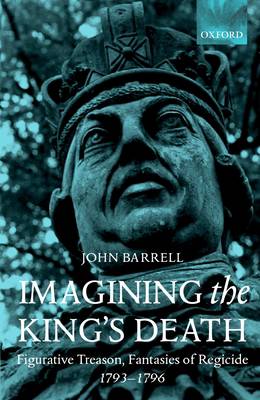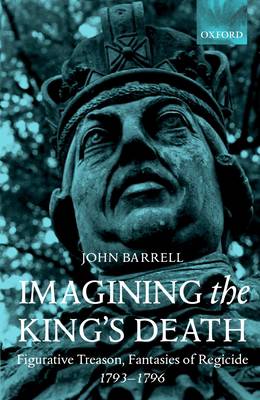
Door een staking bij bpost kan je online bestelling op dit moment iets langer onderweg zijn dan voorzien. Dringend iets nodig? Onze winkels ontvangen jou met open armen!
- Afhalen na 1 uur in een winkel met voorraad
- Gratis thuislevering in België vanaf € 30
- Ruim aanbod met 7 miljoen producten
Door een staking bij bpost kan je online bestelling op dit moment iets langer onderweg zijn dan voorzien. Dringend iets nodig? Onze winkels ontvangen jou met open armen!
- Afhalen na 1 uur in een winkel met voorraad
- Gratis thuislevering in België vanaf € 30
- Ruim aanbod met 7 miljoen producten
Zoeken
Imagining the King's Death
Figurative Treason, Fantasies of Regicide, 1793-1796
John Barrell
Hardcover | Engels
€ 398,95
+ 797 punten
Omschrijving
It is high treason in British law to imagine the king's death. But after the execution of Louis XVI in 1793, everyone in Britain must have found themselves imagining that the same fate might befall George III. How easy was it to distinguish between fantasising about the death of George and imagining it, in the legal sense of intending or designing? John Barrell examines this question in the context of the political trials of the mid-1790s and the controversies they generated. He shows how the law of treason was adapted in the years following Louis's death to punish what was acknowledged to be a "modern" form of treason unheard of when the law had been framed. The result, he argues, was the invention of a new and imaginary reading, a "figurative" treason, by which the question of who was imagining the king's death, the supposed traitors or those who charged them with treason, became inseparable.
Specificaties
Betrokkenen
- Auteur(s):
- Uitgeverij:
Inhoud
- Aantal bladzijden:
- 760
- Taal:
- Engels
Eigenschappen
- Productcode (EAN):
- 9780198112921
- Verschijningsdatum:
- 1/06/2000
- Uitvoering:
- Hardcover
- Formaat:
- Genaaid
- Afmetingen:
- 160 mm x 236 mm
- Gewicht:
- 1406 g

Alleen bij Standaard Boekhandel
+ 797 punten op je klantenkaart van Standaard Boekhandel
Beoordelingen
We publiceren alleen reviews die voldoen aan de voorwaarden voor reviews. Bekijk onze voorwaarden voor reviews.











